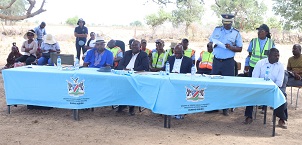
Capricorn Group zooms in on environmental, social and governance value and sustainability reporting

Environmental, social, and governance (ESG) issues are becoming an increasingly important corporate priority globally, and Namibia is no exception. This was the central message on Tuesday this week when players from various corporate sectors of the Namibian economy gathered at the Hilton Hotel in Windhoek for an Investor Relations workshop hosted by Capricorn Group in partnership with GreymatterFinch held under the theme: A decade of change for Namibian investors.
The well-attended event also coincided with the 10th anniversary of the Namibia Stock Exchange listing of Capricorn Group (then Bank Windhoek Holdings). The Capricorn Group Investor Relations event was attended, by among others, listed companies on the Namibian Stock Exchange, private firms, and state-owned entities.
“Access to capital enables companies to fund growth, countries to increase economic development, and more people to experience financial well-being. Since Capricorn Group’s listing in June 2013, (as Bank Windhoek Holdings), investors globally have been embracing stakeholder capitalism, environmental, social, and governance (ESG) aspects, and driving a climate agenda,” said Marlize Horn, Group Executive: Brand and Corporate Affairs of Capricorn Group.
“The purpose of the session was to reflect on the past decade in Namibia as we consider dynamic changes in the investor landscape and ESG reporting. We explored the key drivers of change, local investor expectations, and how companies position themselves for sustainable value creation.”
“We are excited about meaningful change in the Namibian reporting landscape as more companies commit to transparency and true stakeholder engagement,” said Lelanie Hohls, Head of Advisory at GreymatterFinch. “GreymatterFinch has been partnering with Namibian companies in their reporting journey since 2016 and has never seen more interest from corporates and investors alike, particularly around environmental, social, and governance (ESG) reporting. We are proud of our long relationships with Namibian clients, such as Capricorn Group, which are built on trust and collaboration, and a deep understanding of the unique dynamics of this country.”
Capricorn Group’s Head of Sustainability Ruan Bestbier believes the corporate focus has shifted to ensuring that investor needs, shareholder demands, and customer expectations are met as far as sustainability and ESG opportunities are concerned. “The impact of climate change has become a business and living reality, and the world as we know it has changed significantly,” said Bestbier.
As the global view about sustainability also changes, Bestbier is of the view that the conduct of businesses has an impact and dependency that creates risks and opportunities. “Now more than ever, it is essential to embed ESG risk management, reporting, disclosure practices, and other sustainability initiatives into business models and strategies to build a resilient organisation that will not only thrive but remains relevant and competitive in the new reality and future we are facing,” Bestbier added.
“Hence, financial services companies face increasing pressure from their stakeholders in their communities to proactively contribute and effectively address and disclose their commitment to the continent’s interrelated sustainability challenges while demonstrating optimal financial performance. Organisations require dedicated resources such as a sustainability officer to assist with navigating the complex landscape of the sustainability and climate-related reporting and disclosure requirements and to assist with designing and developing a bespoke sustainability integration programme to position the organisation to respond to these changing stakeholder expectations.”
Another speaker at the event, Sara Mezui-Engo, who heads the Alternative Investments Unit at the Government Institutions Pension Fund of Namibia (GIPF), indicated the last decade within the investment space has seen a major shift towards responsible investing.
“Institutional investors (are) prioritising their underlying members to address the principal-agent problem; increased regulation and compliance to tame systemic risk; diversifying into alternative assets and emerging markets in a quest for yield; the mainstream adoption of LDI (liability-driven investment) investing and the advent of technology has reduced costs, increased transparency, and especially empowered retail investors,” she said.
 (From left to right )Lelanie Hohls, Head of Advisory at GMF, Content Creator Victoria Williams (GMF), GIPF’s Manager: Alternative Investments Sara Mezui-Engo, Capricorn Group Executive: Brand & Corporate Affairs Marlize Horn, Reporting Strategist Hymli Krige (GMF) and Capricorn Group’s Head: Sustainability Ruan Bestbier pose for a family photo during the Capricorn Group’s Investor Relations workshop.
(From left to right )Lelanie Hohls, Head of Advisory at GMF, Content Creator Victoria Williams (GMF), GIPF’s Manager: Alternative Investments Sara Mezui-Engo, Capricorn Group Executive: Brand & Corporate Affairs Marlize Horn, Reporting Strategist Hymli Krige (GMF) and Capricorn Group’s Head: Sustainability Ruan Bestbier pose for a family photo during the Capricorn Group’s Investor Relations workshop.










































